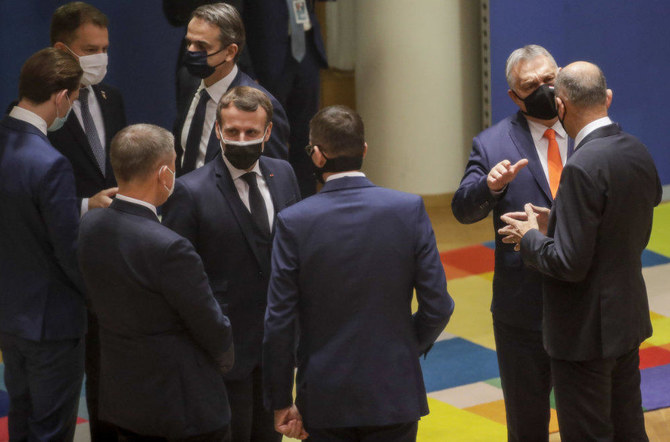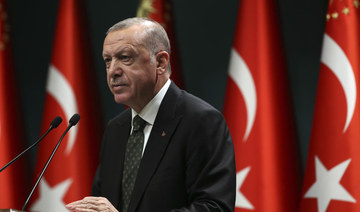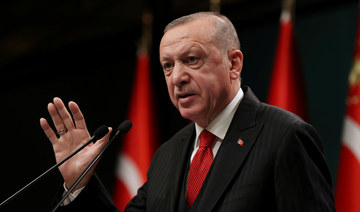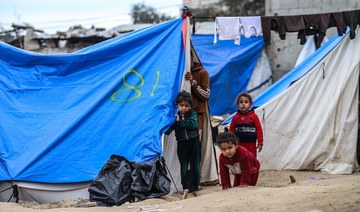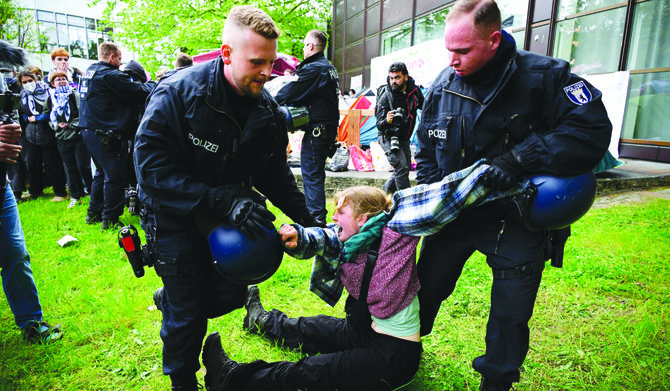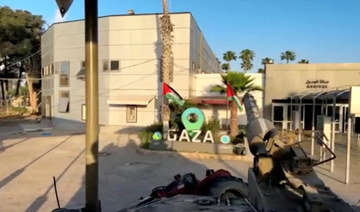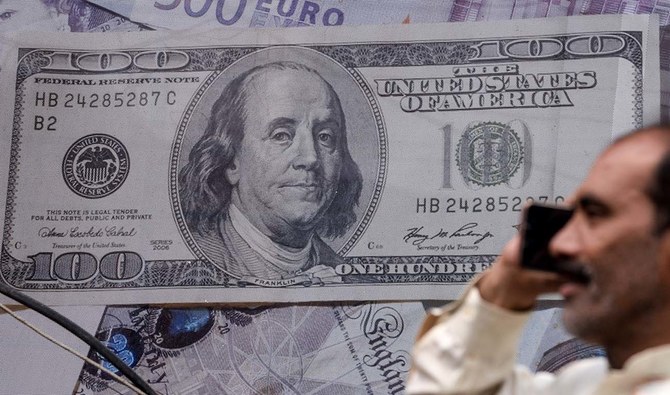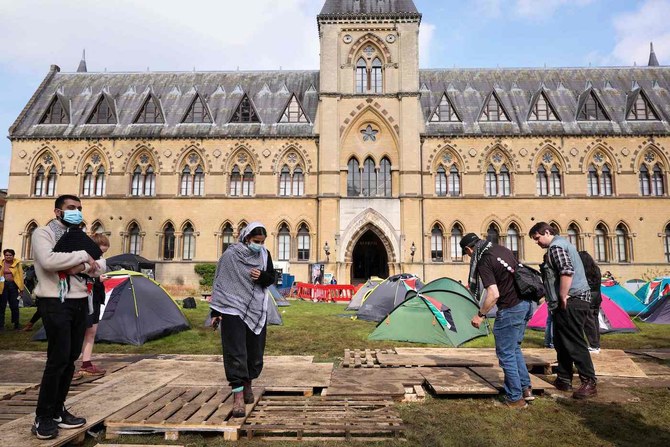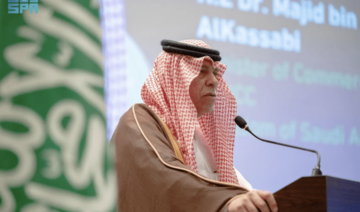ANKARA: The months-long consultations between EU member states over Turkey’s actions in the eastern Mediterranean ended early on Friday with the bloc delaying further sanctions against Ankara but warning of imminent punitive measures if it does not reconsider its contested moves.
The leaders invited the EU members’ ministers to adopt additional listings for sanctions over Turkey’s “unauthorized drilling activities in the eastern Mediterranean.”
Turkey dominated the European Summit agenda of finding common ground over the recent escalation in the Mediterranean where Turkey has insisted on exploration for gas resources including extended continental shelves that are also claimed by Cyprus and Greece.
“Regrettably, Turkey has engaged in unilateral actions and provocations and escalated its rhetoric against the EU, EU member states and European leaders,” EU leaders said in a statement.
The leaders also called on the EU foreign policy chief Josep Borrell to prepare a report about the state of EU-Turkey relations on the political, economic and trade fronts and to suggest a way of proceeding, including the expansion of sanctions. The report is not expected to be submitted until March next year.
The Greek side, pushing for economic sanctions against Turkey’s already weakened economy, however, asserts that EU moves on proceeding with sanctions are closely linked with the credibility of the bloc.
Turkey only recently withdrew its Oruc Reis survey vessel back to port in order not to anger Brussels too much before the summit — a move that was ridiculed by the European Council President Charles Michel as the “play of cat and mouse.”
Last year, the EU prepared a sanctions program to punish “illegal” exploration activities in Cyprus’s exclusive economic zone in the eastern Mediterranean Sea, including the freezing of assets of the people and companies involved.
So far, only two senior officials of Turkey’s state-run Turkish Petroleum Corporation have been put on the sanctions list, despite an expectation that more people will be added to it.
Some sanctions in the past — such as the threat of freezing accession talks — have only pushed Ankara to play the refugee card as a bargaining chip, where it threatens to open the gates for letting refugees into European countries.
For Karol Wasilewski, an analyst at the Warsaw-based Polish Institute of International Affairs, the EU decision was totally expected.
“On one hand, the EU had to do something because its credibility was at stake as during the last few months Turkey did not do anything to appease European decision-makers. On the other, with the election of Joe Biden to the US administration there is a greater chance for a transatlantic approach toward Turkey which may be more effective,” he told Arab News.
“With those two factors combined, we have the only rational result: Minor sanctions and postponement of much more important decisions to March 2021 when the EU will be able to at least check where the Biden administration stands on Turkey,” Wasilewski added.
But experts think that the cat-and-mouse game will continue with no major change on the Turkish side.
“Till March, we will probably witness the same actions from Turkey: After initial anger because of the minor sanctions, there will be a mixture of propaganda that Turkey wants better relations with the EU, provocative acts toward Greece and Cyprus, and, of course, some acts which the Turks would like to present as concessions such as the temporary withdrawal of the Oruc Reis,” Wasilewski said.
In the meantime, another sanctions package is coming from the US. Washington is preparing to execute its long-speculated sanctions against Turkey over its acquisition last year of the Russian S-400 air defense system, Reuters reported on Thursday.
The potential sanctions were harshly condemned by Turkish President Recep Tayyip Erdogan, who called them an act of “great disrespect.”
Turkey’s insistence on testing in December the Russian ground-to-air system despite being urged by its NATO allies against the move is considered the final straw because the missile system poses a serious threat to the alliance’s military equipment and its confidentiality.
Last year, US officials removed Turkey from Lockheed Martin’s F-35 fighter jet program and reiterated that Turkey risked sanctions if it ever activated the missile system.
The US House of Representatives recently passed a defense bill (the National Defense Authorization Act, or NDAA) by a large majority to make it obligatory to enforce sanctions on Ankara for its possession of the Russian-made missiles.
This year’s bill includes a provision requiring the president to impose at least five out of 12 sanctions on Turkey — from symbolic ones to the most severe — within 30 days of the enactment of the NDAA.
The ball is now in the Senate’s court where key Republican lawmakers have already expressed their backing for punitive measures against Turkey.
The move is expected to not only undermine further the already fragile relations between the two NATO allies ahead of the incoming Joe Biden administration but to weaken the Turkish lira amid an economic downturn due to the pandemic-related recession and depleted foreign reserves.
The sanctions, if implemented on a wider scale, are expected to mainly target the Turkish presidency of defense industries and its president Ismail Demir.
According to Max Hoffman, a Turkey analyst from the Washington-based Center for American Progress, at first glance it seems like a response calibrated to convey to Ankara that the US takes this issue very seriously and is willing to go further.
“But Washington would much prefer for Erdogan to reconsider and both sides to avoid an escalatory spiral for the moment,” he told Arab News.
For Ozgur Unluhisarcikli, Ankara office director of the German Marshall Fund of the United States, the imposition of CAATSA (Countering America’s Adversaries Through Sanctions Act) sanctions against Turkey sooner rather than later would have a positive aspect in eliminating uncertainty about the scope of the sanctions, which already deters American companies from doing business with Turkish counterparts.
“Once the scope of the sanctions is clear, cooperation in other areas can continue. It would also be good if the sanctions are imposed before Biden’s inauguration so that sanctions won’t be the first thing the new US administration does regarding Turkey,” he told Arab News.
Separately, outgoing Syria envoy James Jeffrey said in a recent interview that Erdogan “won’t back down until you show him teeth.”
“You have to be willing, when Erdogan goes too far, to really clamp down on him and to make sure he understands this in advance,” he said of how the new US administration should approach Ankara.



